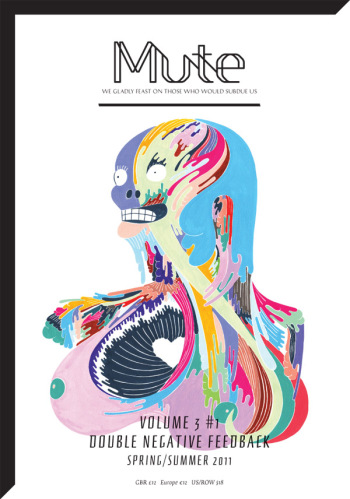Critical Studies in Peer Production, Nr. 1: Mass Peer Activism (2011)
Filed under journal | Tags: · activism, actor-network theory, commons, filesharing, internet, mass collaboration, networks, p2p, peer production, wikipedia

Critical Studies in Peer Production (CSPP) is a new open access, online journal. Through the analysis of the forms, operations, and contradictions of peer producing communities in contemporary capitalist society, the journal aims to open up new perspectives on the implications of peer production for social change.
Issue 1 is divided in three sections:
– Research papers by Andersson and O’Neil
– Debate papers by Söderberg, Tkacz and O’Neil
– Reports by Niesyto & Tkacz and Dobusch & Thorne
Editor: Mathieu O’Neil
Published by Oekonux, June 2011
Sections:
View online: Research: Mass peer activism (HTML articles)
View online: Debate: ANT and power (HTML articles)
View online: Reports (HTML articles)
Mute, 3(1): Double Negative Feedback (2011)
Filed under magazine | Tags: · architecture, art, capitalism, contemporary art, cultural politics, economics, financial crisis, journalism, music, neoliberalism, networks, politics, uk, wikileaks

“‘Double Negative Feedback’ expresses the hope that the chaos unleashed by the cybernetic loops of financialisation, post-Fordist production and networked life might not only be entropic and exploitative. The noise generated by ‘positive feedback’ also takes the form of the explosions we are seeing in the Arab world, the anti-disciplinary uses of cybernetic control systems, the ‘shared precarity’ of compositional improvising, and the ripples of a political organising that no longer assumes a common identity but instead acknowledges our common vulnerability. This issue scouts out such double-negative loops in a landscape dominated by the relentless, if often misfiring attempt to put feedback to work.”
Edited by Josephine Berry Slater
Publisher Mute, London, June 2011
Ned Rossiter: Organized Networks: Media Theory, Creative Labour, New Institutions (2006)
Filed under book | Tags: · creative industries, critique, democracy, governance, information society, intellectual property, internet, labour, media theory, networks, technology

The celebration of network cultures as open, decentralized, and horizontal all too easily forgets the political dimensions of labour and life in informational times. Organized Networks sets out to destroy these myths by tracking the antagonisms that lurk within Internet governance debates, the exploitation of labour in the creative industries, and the aesthetics of global finance capital. Cutting across the fields of media theory, political philosophy, and cultural critique, Ned Rossiter diagnoses some of the key problematics facing network cultures today. Why have radical social-technical networks so often collapsed after the party? What are the key resources common to critical network cultures? And how might these create conditions for the invention of new platforms of organization and sustainability? These questions are central to the survival of networks in a post-dotcom era. Derived from research and experiences participating in network cultures, Rossiter unleashes a range of strategic concepts in order to explain and facilitate the current transformation of networks into autonomous political and cultural ‘networks of networks’.
Publisher: Eelco van Welie, NAi Publishers, Rotterdam
In association with the Institute of Network Cultures, Amsterdam
ISBN 9056625268, 9789056625269
250 pages

